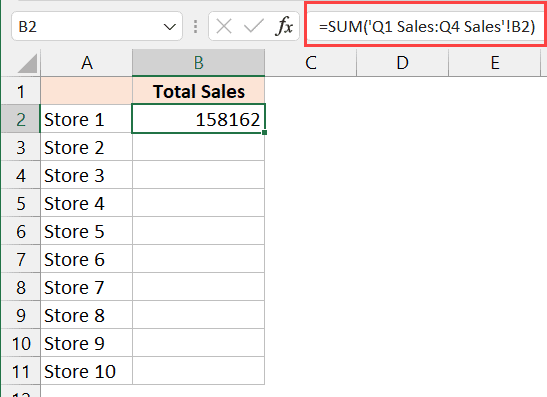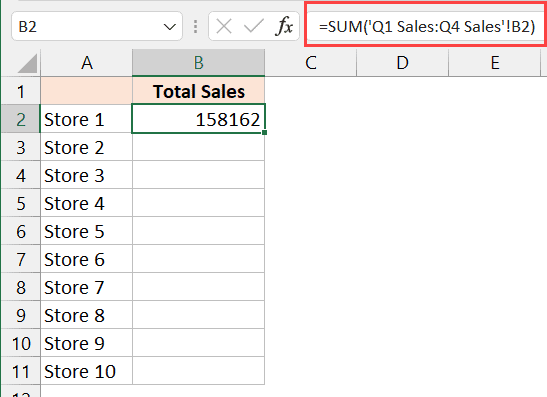Adding Sums Across Excel Sheets: A Simple Guide

Working with Excel involves more than just dealing with individual spreadsheets; it's also about understanding how to harness the power of data spread across multiple sheets to streamline your work processes. Whether you're aggregating financial data, consolidating monthly reports, or simply keeping track of various project elements, summing data from multiple sheets in Excel can significantly boost your productivity. In this comprehensive guide, we'll walk you through the steps to sum across sheets effectively, along with some advanced techniques to automate this process.
Understanding Excel Sheets and Basic Summation

Before diving into complex calculations, it’s crucial to understand how Excel organizes data:
- Workbooks: Excel files are called workbooks. A workbook can contain multiple sheets.
- Sheets: These are the individual pages within a workbook where you enter and manipulate data.
The basic sum operation in Excel is achieved by the SUM function:
- Select a cell where you want the sum to appear.
- Type
=SUM(, then select the cells you want to sum, and close with). For example,=SUM(A1:A10)sums values from cell A1 to A10.
Summing Data Across Multiple Sheets

When your data spans across different sheets, summing becomes a bit more intricate:
- To sum the same cell or range across different sheets, use the 3D SUM function:
- Enter
=SUM(Sheet1:Sheet3!A1)to sum cell A1 from Sheet1, Sheet2, and Sheet3. - This formula tells Excel to look at sheets from Sheet1 to Sheet3, selecting cell A1 on each sheet and summing them.
- Enter
- For non-contiguous sheets, list them individually within the
SUMfunction:- Example:
=SUM(Sheet1!A1,Sheet3!A1,Sheet4!A1)sums cell A1 from these three separate sheets.
- Example:
Advanced Techniques for Summation

Using Named Ranges

Named ranges can make your formulas easier to understand:
- Define a range on each sheet with the same name using the
Insert > Name > Define Namefeature. - Now, to sum these ranges across sheets, simply use
=SUM(Sheet1!NamedRange, Sheet2!NamedRange, Sheet3!NamedRange).
Dynamic Sheet Reference

For scenarios where sheets might be added or removed, using an INDIRECT function with a COUNTA or similar can provide dynamic sheet references:
- Example formula:
=SUMPRODUCT(SUM(INDIRECT(“‘”&SheetNames&“’!A1”))), whereSheetNamesis a named range containing all sheet names you wish to sum.
Macro Automation for Summation

For repetitive tasks or when dealing with a large number of sheets, VBA macros can automate summing across sheets:
Sub SumAcrossSheets() Dim ws As Worksheet Dim TotalSum As Double TotalSum = 0For Each ws In ThisWorkbook.Sheets If Not ws.Name = "Summary" Then TotalSum = TotalSum + ws.Range("A1").Value End If Next ws Sheets("Summary").Range("B1").Value = TotalSum
End Sub
🌟 Note: Always ensure your sheet names are consistent and that formulas account for blank sheets or missing data to avoid errors.
In your data management journey with Excel, understanding how to effectively sum data across sheets will greatly enhance your efficiency. Whether you're compiling reports, tracking inventories, or preparing financial statements, these techniques ensure that your data remains dynamic, accurate, and manageable.
Here are the key takeaways from this guide:
- Basic summing across cells uses the SUM function, while summing across sheets uses 3D SUM.
- Named ranges and dynamic references help maintain formula readability and adaptability.
- VBA macros can automate repetitive tasks, making your workflow more efficient.
By mastering these methods, you'll find yourself with more time to analyze your data and less time spent on data consolidation. Excel's power lies not just in its functions, but also in how these functions can be combined and applied across multiple sheets to simplify complex tasks.
Can I sum data from sheets that aren’t named sequentially?

+
Yes, you can sum data from non-sequentially named sheets by listing each sheet individually within the SUM function or using dynamic references.
How do I handle sheets that might be added or removed in the future?

+
Use named ranges or formulas that dynamically reference sheets, like INDIRECT with COUNTA, to ensure your summation adjusts automatically when sheets are added or removed.
What happens if one of the sheets does not have data in the cell I want to sum?

+
If a cell is blank, Excel will treat it as zero in the sum. However, ensure your formulas account for potential data inconsistencies to avoid unexpected results.



